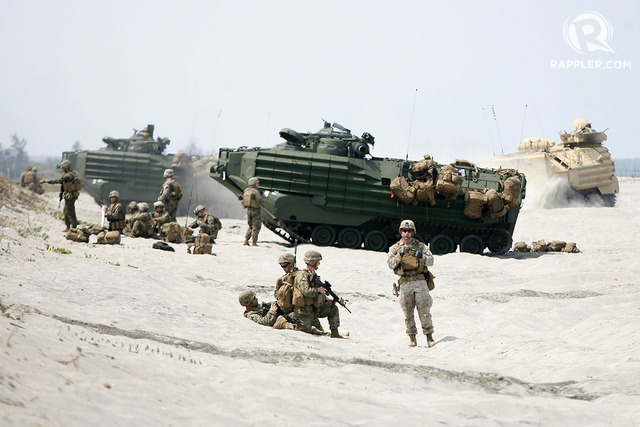Presidential Spokesman Salvador Panelo says the Duterte government is not concerned the United States may terminate other military treaties following the Philippines' move to scrap the Visiting Forces Agreement

PH-US WAR GAMES. This file photo shows US soldiers and their Filipino counterparts joining forces in an Amphibious Landing operation as part of the 2015 Balikatan Exercises made possible by the VFA. File photo by Ben Nabong/Rappler
Presidential Spokesman Salvador Panelo downplayed the possibility of the United States terminating other military treaties with the Philippines, following the Duterte government's efforts to start the process of terminating the two countries' Visiting Forces Agreement (VFA).
Panelo said the Duterte administration was not concerned with such a fallout when asked to comment on how the Philippines would respond if the US terminated the Enhanced Defense Cooperation Agreement (EDCA) – the operational aspect of the VFA – and the overarching Mutual Defense Treaty (MDT).
"That's in the realm of speculation. I think the treaties benefit more the Unite d States than the Philippines. Strategically, the US needs to be in almost every part of the world to secure itself from its perceived enemies," Panelo told reporters on Monday, January 27.
On Thursday, January 23, President Rodrigo Duterte warned the US government he would scrap the VFA if it failed to "correct" the cancelled visa of his former police chief and now Senator Ronald dela Rosa. A day after, Foreign Secretary Teodoro Locsin Jr announced he would "start the process" of terminating the VFA.
The VFA, ratified by the Philippine Senate in 1999, outlined guidelines for the conduct of American troops visiting the Philippines and is the foundation for military exercises between the Philippines and the US.
It was an affirmation of the Philippines and US' obligations under the 1951 MDT, which is the Philippines and US' commitment to defend each other in case of an attack. The Aquino-time EDCA, which provided for increased military presence of the US in the Philippines, operationalized the VFA.
'Tactical, thinking President'
Panelo refuted criticism that Duterte's decision was rash and disproportionate to the US' cancellation of Dela Rosa's visa, insisting it was a "studied response" from a "tactical and thinking" President.
Aside from Dela Rosa's cancelled visa, Panelo said among the reasons Duterte renewed threats to scrap the VFA was his anger over US lawmakers' efforts to sanction Philippine officials involved in extrajudicial killings and the detention of Senator Leila de Lima.
Justice Secretary Menardo Guevarra earlier told reporters Malacañang ordered a "preliminary impact assessment on the possible termination of the VFA," expanding the scope of the justice department's initial study on the matter. Guevarra was supposed to submit to Duterte on Monday his legal memorandum procedures to terminate the VFA.
Despite this, Panelo said termination of the VFA was still "in place."
https://www.rappler.com/nation/250325-malacanang-downplays-possibility-united-states-terminates-other-military-pacts
Panelo said the Duterte administration was not concerned with such a fallout when asked to comment on how the Philippines would respond if the US terminated the Enhanced Defense Cooperation Agreement (EDCA) – the operational aspect of the VFA – and the overarching Mutual Defense Treaty (MDT).
"That's in the realm of speculation. I think the treaties benefit more the Unite d States than the Philippines. Strategically, the US needs to be in almost every part of the world to secure itself from its perceived enemies," Panelo told reporters on Monday, January 27.
On Thursday, January 23, President Rodrigo Duterte warned the US government he would scrap the VFA if it failed to "correct" the cancelled visa of his former police chief and now Senator Ronald dela Rosa. A day after, Foreign Secretary Teodoro Locsin Jr announced he would "start the process" of terminating the VFA.
The VFA, ratified by the Philippine Senate in 1999, outlined guidelines for the conduct of American troops visiting the Philippines and is the foundation for military exercises between the Philippines and the US.
It was an affirmation of the Philippines and US' obligations under the 1951 MDT, which is the Philippines and US' commitment to defend each other in case of an attack. The Aquino-time EDCA, which provided for increased military presence of the US in the Philippines, operationalized the VFA.
'Tactical, thinking President'
Panelo refuted criticism that Duterte's decision was rash and disproportionate to the US' cancellation of Dela Rosa's visa, insisting it was a "studied response" from a "tactical and thinking" President.
Aside from Dela Rosa's cancelled visa, Panelo said among the reasons Duterte renewed threats to scrap the VFA was his anger over US lawmakers' efforts to sanction Philippine officials involved in extrajudicial killings and the detention of Senator Leila de Lima.
Justice Secretary Menardo Guevarra earlier told reporters Malacañang ordered a "preliminary impact assessment on the possible termination of the VFA," expanding the scope of the justice department's initial study on the matter. Guevarra was supposed to submit to Duterte on Monday his legal memorandum procedures to terminate the VFA.
Despite this, Panelo said termination of the VFA was still "in place."
https://www.rappler.com/nation/250325-malacanang-downplays-possibility-united-states-terminates-other-military-pacts

No comments:
Post a Comment
Note: Only a member of this blog may post a comment.